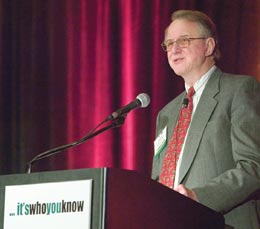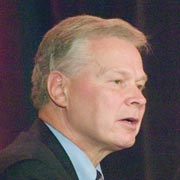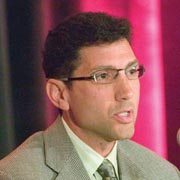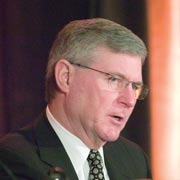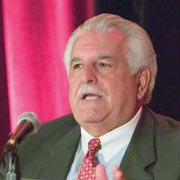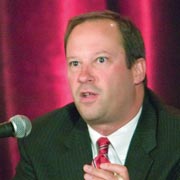 |
 |
 |
|
What lies ahead A blue ribbon panel eyes the future of the independent agency system By Elisabeth Boone, CPCU In the property/casualty business, as in any industry, pundits and prognosticators are a dime a dozen. A lot of self-styled experts toss opinions around like confetti, but a few wise heads possess the clarity of vision to see into the likely future. Nine such savants were on hand to offer their views to attendees at the IMMS/Group 500 Annual Conference presented by Insurance Marketing & Management Services (IMMS) in May. Held in Chicago, the conference focused on helping agents, brokers, and other insurance professionals develop a network of valuable contacts in the business. A highlight of the event was a panel discussion moderated by George Nordhaus, founder and chairman of IMMS/Group 500. The panelists represented a broad cross section of the property/casualty business: Roger Looyenga, CEO, Auto-Owners Insurance Group; Robert Sargent, president, Tennant Risk Services; Mark Manfre, executive vice president, Insurance Office of America; Dan Carmichael, CEO, Ohio Casualty; Dan Epstein, president, ResourcePro; William Hold, cofounder and president, The National Alliance for Insurance Education & Research; Frank Burke, president and CEO, First Insurance Funding; Mike Schroeder, president, Roundstone Insurance; and Al Diamond, president, Agency Consulting Group. The independent route Offering his perspective on the state of the independent agency system was Roger Looyenga. In its 24-state territory, Auto-Owners is represented by some 5,500 independent agencies, which are its sole source of distribution. “We’ve all heard about the demise of the independent agency system,” Nordhaus said. “Why do you go the independent agency route?” “We’ve done business with independent agents for 90 years,” Looyenga responded, “and the reason we’ve always done it that way is because it’s a great way to market the product.” According to a recent survey, Looyenga said, respondents want five things when making a purchase: to buy from someone they know and trust; to pay a competitive price, although not necessarily the lowest price; to have a choice in what they buy; to have one-stop shopping; and to get service from the person they bought from. “Only the independent agent can provide all five of those needs,” Looyenga declared, pointing out that the officers of the company had signed a pledge that they would not go to a competing system. What’s up in wholesale? When retail independent agents and brokers have unusual or hard-to-place risks, they turn to specialty wholesalers. One such firm is Tennant Risk Services Insurance Agency, LLC, a wholesale underwriting manager and broker based in Hartford, Connecticut. Licensed in all 50 states, Tennant also is a Lloyd’s correspondent broker. Asked by Nordhaus to assess the future of intermediaries in the market, Tennant’s president, Robert Sargent, said, “I think general agents and wholesalers have a very bright future in the market. I tend to measure people’s prospects based on the added value they provide their customers. In the insurance business, especially in specialty lines, focusing on specialization provides an important advantage to our customers. I think we’ve been very successful in supporting retail independent agents. “We’ve delivered online programs for quite a while, but this is the first time we’ve really pushed the online system,” Sargent said. A key concern with any such system, he noted, especially in specialty lines, is underwriting accuracy. “That’s a very difficult proposition. We’ve developed a very thorough application and put it online. Of course, if the retailer has questions, he can call and discuss them with an underwriter.” Power of partnership A fast growing, privately held agency with premium of over $550 million, Insurance Office of America, Longwood, Florida, operates 18 offices in eight states. Mark Manfre is one of IOA’s original partners and its second largest producer, specializing in the real estate, construction, and manufacturing industries. Nordhaus asked Manfre how IOA grew to $550 million in premium in just 18 years. He explained, “The typical agency has producers who build up a book of business but don’t get to share in the profits or ownership of the agency. The vision of our founder, John Ritenour, was to bring in producers and give them something they don’t get elsewhere: the opportunity for ownership in the agency.” After two years of satisfactory production, producers are invited to buy stock in IOA. All commissions, including contingencies, are assigned to IOA, which holds the contracts with the carriers. All commissions for personal lines and small commercial accounts (under $10,000 premium) are retained by the agency. “We pay our agents 60% for both new and renewal business,” Manfre said. “A lot of people have said, ‘There’s no way you can stay in business for 18 years when you’re paying 60%.’ The fact is, if you reach certain premium thresholds, you can pay 60% with no trouble at all,” he declared. “Our model is working.” Technology rules When Ohio Casualty tapped Dan Carmichael to be its new president and CEO, expenses were high, efficiency was low, and the top management of parent company Ohio Casualty Corporation realized it was time for a change. “Technology was one of the answers,” he recalled. “We believe today that all of the elements that are necessary for single entry, multiple company interface (SEMCI) are available. We’ve been saying for at least 30 years that we’re a year or two away from SEMCI. Now we are there,” he declared. “We want you to be able to stay in your agency management system. It makes no sense for you to have to toggle out of that system, go into a proprietary Web site—and there are plenty of them out there—for you to be able to input that same data that’s in your system, whether it’s a quote or an endorsement or a bill for a customer. Whatever the case, you should not have to rekey any of that information online.” Rekeying data is inefficient and costly not only for agents but also for carriers, Carmichael asserted. “You, as agents, have a lot more control over this situation than company management or vendors do,” he said. “I ask each of you to contact your carriers and find out why they aren’t using more applications. They need to accurately and quickly build out as many applications as possible in their systems so that you have basically transparent access to their systems,” Carmichael said. Outsourcing is in With its huge volume of transactions—millions daily, at least—the property/casualty business is extremely labor intensive. Advances in technology, as Dan Carmichael noted, have helped both insurers and agents enhance their efficiency and reduce expenses. Even with sophisticated automation systems, however, agency support staffers continue to bear a heavy load in processing transactions. Dan Epstein, vice president of business development for ReSource Pro, said his firm offers a solution for bogged-down small to mid-sized agencies: remote staffing. Through remote staffing, Epstein explained, ReSource Pro provides experienced, college-educated insurance processing specialists in China, who connect remotely to the agency’s system via the Internet. The service is available to retail brokers, MGAs, and program managers. The agency is not required to migrate its management system or data to an external provider. ReSource Pro receives daily task updates via electronic fax, e-mail, suspense codes in the agency’s management system, and according to scheduled priority lists. The agency can set access restrictions and monitor performance of the remote processing specialists. Among the tasks those specialists can perform are policy checking, issuance, and endorsements; rating, quote preparation, and binding; billing, reconciliation, and claims reporting; and inspection reviews, MVRs, etc. His company’s experience shows, Epstein said, that remote processing has had a substantial impact on both the top line and the bottom line of the agencies that use ReSource Pro: “on the top line by increasing the productivity of their people, and on the bottom line because it’s significantly cheaper to have the same people in China doing the work quickly and accurately.” The education piece The National Alliance for Insurance Education and Research provides practical, hands-on education and training to producers, risk managers, and service representatives. In response to a question about the marketplace, Dr. William T. Hold replied: “I see two things—excitement and fear. Those agencies that are successful are doing pretty well” because of stable markets and having a strong sales organization. “The fear part,” Dr. Hold noted, “especially in Florida, Louisiana, and Mississippi, is that agencies are worried about their customers not coming back. It’s very disturbing to reopen your agency and have no customers. Where did they all go? Many of them haven’t returned to the Gulf Coast; they haven’t returned to New Orleans. There are tremendous implications when the infrastructure dies.” New trends in premium finance Frank Burke of FIRST Insurance Funding, Inc., Northbrook, Illinois, offered a perspective on emerging trends in the premium finance business. He observed that what just 10 or 15 years ago was a relatively simple and straightforward business has become both complex and sophisticated. He pointed out, “Our biggest competitors are insurance companies themselves. More than half of the premiums written that are eligible for financing are financed by carriers, either on a no-interest basis or on a very low-cost basis. We still don’t understand why a business that sells a product decides they have to offer the opportunity to pay for that product on a monthly installment basis at no charge. Most industries don’t do that. We see it as our job to continue to educate insurance companies that when you sell a product that’s effective on January 1, you really should be paid for it on January 1. Put that money into investments and let us do the business of billing and collecting premiums. “We see agents and brokers beginning to view premium financing not as something to offer their slower paying clients for cash flow,” Burke continued, “but to offer to everyone as an additional service.” Captive update Michael Schroeder of Roundstone Insurance, Westlake, Ohio, presented an update on developments in the captive insurance market. Schroeder, an attorney, is responsible for the management and development of Roundstone, a Class III segmented account reinsurer based in Bermuda. “One publication says that captives are growing faster than the standard commercial market,” Schroeder said. “That’s catching a lot of people’s attention. More and more states are passing legislation to support the captive idea.” Asked what factors are spurring the growth of captives, Schroeder said, “One thing that’s happening is that the service providers that run captives and provide investment management services are becoming more sophisticated and more effective at delivering their services all over this country. In the old days you had to fly to the Cayman Islands or Bermuda in order to sit down and have a meeting to find a captive solution or an investment solution for your client. Today we have the Internet and electronic delivery of documents. We manage our captive facilities from Ohio,” Schroeder said. “Why should agents get involved with captives?” Nordhaus asked. Schroeder said. “It’s another retention product that you can make your clients aware of. For an account with loss participation of half a million dollars, we’re going to suggest a captive alternative. We think it beats a high deductible or a high SIR. “The other reason I think agents should look at captives is that if you have a particular class of business that you’re having a hard time finding an insurer to deal with, you can put together a captive and have that group or your agency take some of the risk,” Schroeder continued. “The distressed lines tend to find themselves a captive solution. Construction today is an area where I see captive activity almost every week,” he commented. Finally, “Your agencies are good underwriters, and you ought to give some consideration to sharing in the underwriting profit,” Schroeder asserted. There are some classes of business with sub 50% loss ratios, and you can make a fairly handsome return on your investment for retaining some of that risk,” he noted. A consultant’s view Offering his perspective on changes in the property/casualty business over the past 30-plus years was Al Diamond of Agency Consulting Group, Inc., Cherry Hill, New Jersey. “The independent agency system is not on a downhill slope, although in the last 20 or 25 years the number of agencies has declined from about 70,000 or 72,000 to our estimate of about 40,000 or 42,000 now,” Diamond said. “It’s not the number of people in agencies that has declined, just the number of agencies, and it’s not because of business failures. It’s because of lack of perpetuation, agents cashing out when they retire. These are folks who run small, medium-sized, and large agencies who would rather get the cash than perpetuate their agencies. That’s not our favorite thing,” he continued. “We’re in the business of agency perpetuation.” Today, he commented, “Agencies are growing larger, and they’re becoming more professional. But as others have observed, there’s still a niche for small agencies to remain intact, to remain in their local areas, and to do very well for themselves as part of a larger organization,” Diamond said. “My comment to insurers with which I do business is: We should be dedicated to growing and making money. If the successful members of the independent agency system can grow your business, use them. If the agencies can’t grow your business, grow it some other way. I happen to think that independent agents can very well grow the business,” Diamond declared. * |
|
|||||||||||||||||||||||||||||||||||||||||
| ||||||||||||||||||||||||||||||||||||||||||
